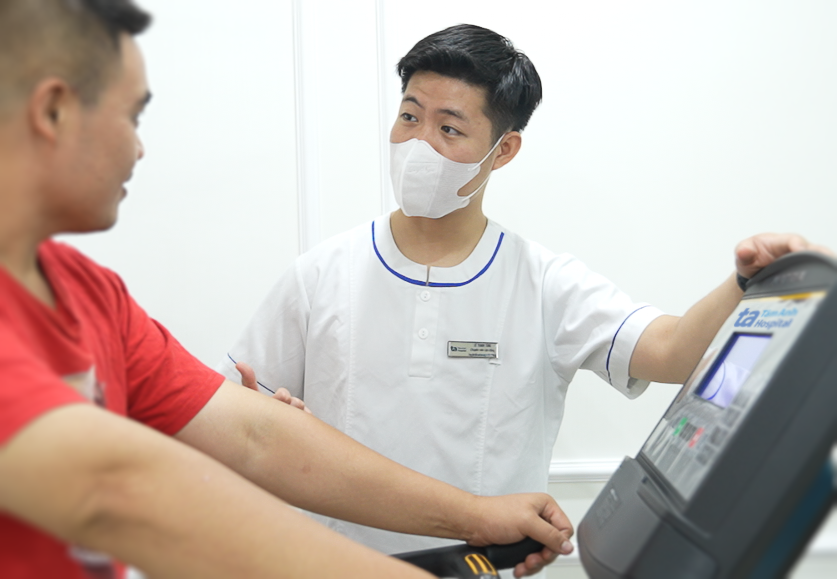Initially, Hung worked out at the gym for 2 hours a day. Not seeing significant weight loss, he added 3 hours of pickleball daily. He lost 14 kg, but experienced exhaustion and loss of appetite after exercising. Recently, his toe joint swelled, suspecting a gout relapse, so he went to Tam Anh General Hospital in Hanoi.
Doctor Dong Thi Thuy Quynh, from the Department of Musculoskeletal, ordered blood tests. The results showed high uric acid levels, liver enzymes, and a creatine kinase (CK) level of 13,319 U/L, over 100 times the average for men. Doctor Quynh diagnosed Hung with acute gout and rhabdomyolysis due to excessive exercise.
Skeletal muscle comprises over 600 muscles covering the bones, attached to tendons, accounting for up to 40% of body weight. According to Doctor Quynh, this is the only muscle group that humans can consciously control, enabling all body movements like walking, working, exercising, and playing sports. Rhabdomyolysis occurs when these muscle cells are destroyed, releasing intracellular components such as potassium, phosphate, myoglobin, and creatine kinase into the bloodstream. This can cause dangerous complications like high blood potassium and phosphate, and acute kidney injury. Without prompt detection and treatment, patients can experience acute renal failure, metabolic acidosis, multiple organ failure, and even death.
 |
Doctor Quynh explains the situation to the patient. Photo: Tam Anh General Hospital |
Doctor Quynh explains the situation to the patient. Photo: Tam Anh General Hospital
Doctor Quynh explained that continuous excessive physical activity, like Hung's, prevents muscle fibers from resting and recovering, leading to cell death and rhabdomyolysis. This condition often occurs in individuals who increase exercise intensity too quickly, those who repeatedly work only one muscle group (like push-ups, squats, or weightlifting), or those who participate in endurance sports for extended periods (such as marathons, long-distance cycling, or prolonged competitive sports).
Prolonged exercise can also cause dehydration and overheating, accelerating muscle breakdown. Patients often experience muscle swelling, pain, fatigue, and dark urine, but mistake these as normal exercise side effects and don't seek medical attention. Only when rhabdomyolysis becomes severe, leading to complications like acute kidney injury and high myoglobin levels turning urine red, do patients visit the hospital and receive a diagnosis. Tam Anh General Hospital has recorded cases where acute rhabdomyolysis progressed from initial symptoms to multiple organ failure in just two days.
If rhabdomyolysis from overtraining is detected early, patients only need rest, intravenous fluids, and electrolytes to help the body eliminate toxins. In cases of late detection, patients may require diuretics, blood filtration, or dialysis.
Hung was prescribed anti-inflammatory medication and intravenous fluids to eliminate toxins, with monitoring of fluid intake and output to prevent electrolyte imbalances and acid-base disturbances. After two days, repeat blood tests showed stable uric acid levels, CK levels significantly decreased to 5,130 U/L, urine color improved, and joint swelling and pain reduced. Hung continued to receive intravenous fluids and remained under observation.
 |
An exercise physiologist guides an overweight person through an exercise program. Photo: Tam Anh General Hospital |
An exercise physiologist guides an overweight person through an exercise program. Photo: Tam Anh General Hospital
Doctor Quynh advises that those who exercise or play sports should have a well-structured plan with adequate rest. For beginners or those starting a new sport, it's crucial to start with low intensity and gradually increase it, while listening to their body. They should stay hydrated, avoid exercising in excessively hot environments, incorporate rest, and maintain a balanced diet. They shouldn't push themselves too hard or restrict their diet excessively just to achieve rapid weight loss.
Anyone experiencing muscle fatigue and pain lasting more than 3 days, along with dark, brown, or tea-colored urine, should reduce exercise intensity and seek immediate medical attention. Overweight and obese individuals should consult a doctor for safe and effective weight management.
Thanh Long
*The patient's name has been changed.












